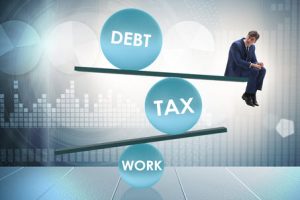Does Bankruptcy Clear Back Taxes?

The sudden emergence of the gig economy is the main reason Americans owe about $131 billion in back taxes. Self-employment income often has significant, and unexpected, peaks and valleys. If these individuals prepay their taxes monthly and are a few dollars short each month, that could mean a big tax bill at the end of the year.
The IRS is the world’s largest debt collector. It routinely utilizes tools, such as nonjudicial wage garnishment, that other debt collectors dream about having. Frequently, bankruptcy is the only shelter from the storm. A Chicago bankruptcy lawyer can show debtors several ways to erase their income tax debt and obtain the fresh start the Bankruptcy Code guarantees.
Discharge in a Chapter 7
Most unsecured debts, like credit cards and medical bills, are dischargeable in a Chapter 7. “Discharge” means the judge eliminates the legal obligation to repay the debt. But past-due income taxes, like student loans and a few other obligations, are priority unsecured debts. As a result, they are only dischargeable in certain situations. In this area, these rules are:
- Three Years: The income tax debt must be at least three years old. Note that Tax Day is not always April 15. And, the IRS has contested discharge because the taxes at issue were a few days shy of three years old.
- Two Years: The returns at issue must have been on file for at least two years. Substitute returns that the IRS files on the taxpayer’s behalf do not count. Also, only income tax is dischargeable. Other taxes, like payroll and property taxes, are usually nondischargeable.
- 240 Days: Income tax debt is dischargeable if it meets the previous two requirements and the IRS has not assessed the debt in the last 240 days. Generally, if the IRS has not sent a letter with the balance due in the past eight months, the Service has probably not assessed the debt.
The bankruptcy judge only has the power to discharge the debt. A bankruptcy court order does not affect the collateral consequences of debt. So, if the IRS filed a lien before the taxpayer filed bankruptcy, an attorney must deal with the lien separately.
Repayment in a Chapter 13
The aforementioned assessment requirement makes many income taxes nondischargeable. It usually takes the IRS several months to assess a debt and begin collection proceedings, but it might not take eight months.
Thanks to the recently-unveiled Fresh Start Initiative, taxpayers have more non-bankruptcy options to repay their tax debt over time. However, these programs do not accept everyone. And, while the taxpayer makes payments, penalties and interest usually continue to accrue.
So, Chapter 13 might be a better option. Almost everyone qualifies for Chapter 13. Debtors have up to five years to erase debt delinquency, including past-due mortgage payments and past-due income taxes. As a bonus, other types of taxes, such as property taxes, might be includable in the Chapter 13 repayment plan.
If debtors need additional time to repay tax debt, they might be able to file a Chapter 13 following a Chapter 7. This option, which is available in many jurisdictions, is called a Chapter 20 bankruptcy.
Reach Out to Dedicated Lawyers
A bankruptcy filing might be the best way, or the only way, to eliminate back tax debt. For a free consultation with an experienced bankruptcy attorney in Chicago, contact the Bentz Holguin Law Firm, LLC. Convenient payment plans are available.
Resource:
irs.gov/statistics/soi-tax-stats-irs-data-book


